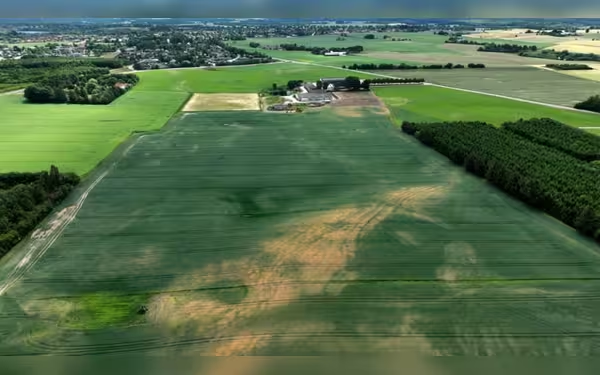Friday, November 22, 2024 10:51 AM
Denmark's Bold Move to Convert Farmland into Forests
- Denmark to convert 15% farmland into forests.
- 43 billion crowns allocated for land purchase.
- First country to impose carbon tax on agriculture.
 Image Credits: channelnewsasia
Image Credits: channelnewsasiaDenmark plans to convert 15% of farmland into forests to reduce fertilizer use and enhance environmental sustainability.
COPENHAGEN: Denmark is taking a significant step towards environmental sustainability by planning to convert 15 percent of its farmland into forests and natural habitats. This initiative aims to tackle the pressing issue of fertilizer usage, which has led to severe oxygen depletion in Danish waters and a decline in marine life. Lawmakers announced this ambitious plan on November 18, highlighting the urgent need for action.
Denmark is known for its intensive farming practices, with nearly two-thirds of its land dedicated to agriculture. To support this transformation, the Danish government has allocated 43 billion Danish crowns (approximately US$6.1 billion) to purchase land from farmers over the next two decades. This financial commitment underscores the seriousness of the situation and the government's determination to foster a healthier environment.
In addition to converting farmland, Denmark is also making history by becoming the first country to impose a carbon tax on agriculture. This tax is part of a broader strategy to reduce greenhouse gas emissions, which are primarily generated by agricultural activities. The government plans to plant one billion trees on the converted farmland over the next 20 years, a move that is expected to enhance biodiversity and improve air quality.
The initiative is part of a green deal that was reached in June, involving collaboration between farmers, industry representatives, labor unions, and environmental groups. The newly established ministry for the Green Tripartite agreement, created in August, will oversee the implementation of this plan. Reducing emissions from agriculture has been a significant challenge for Danish lawmakers, especially as they strive to meet a legally binding target of cutting greenhouse gas emissions by 70 percent from 1990 levels by the year 2030.
This year, oxygen levels in Danish waters have dropped to alarming lows, primarily due to nutrient runoff from fertilizers used in lowland farming. This situation poses a serious threat to marine ecosystems and highlights the urgent need for sustainable agricultural practices.
Denmark's decision to convert a portion of its farmland into forests is a bold and necessary step towards environmental restoration. By addressing the issues caused by excessive fertilizer use, the country not only aims to protect its waters and marine life but also sets a precedent for other nations to follow. As global awareness of environmental issues grows, Denmark's actions may inspire similar initiatives worldwide, fostering a collective effort to combat climate change and promote sustainability.













